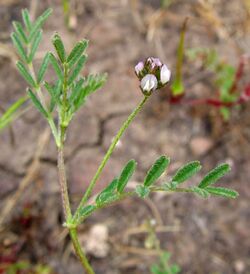Biology:Astragalus didymocarpus
| Astragalus didymocarpus | |
|---|---|

| |
| var. didymocarpus | |
| Scientific classification Error creating thumbnail: Unable to save thumbnail to destination
| |
| Kingdom: | Plantae |
| Clade: | Tracheophytes |
| Clade: | Angiosperms |
| Clade: | Eudicots |
| Clade: | Rosids |
| Order: | Fabales |
| Family: | Fabaceae |
| Subfamily: | Faboideae |
| Genus: | Astragalus |
| Species: | A. didymocarpus
|
| Binomial name | |
| Astragalus didymocarpus Hook. & Arn.
| |
Astragalus didymocarpus is a species of milkvetch known by the common names Dwarf white milkvetch and Two-seeded milkvetch. It is native to the southwestern United States and northern Mexico, where it can be found in many types of habitat.
Description
Astragalus didymocarpus is a slender, hairy annual herb growing erect to about 30 cm (12 in) tall, drooping, or flat on the ground in a spreading clump. The leaves are up to 7 to 8 cm (2.8 to 3.1 in) long and are made up of narrow to oblong leaflets. The inflorescence is a cluster of up to 30 purple-tinted white flowers, each under 1 cm (0.39 in) long. The inflorescence is covered in long black and white hairs.
The fruit is a small, spherical legume pod which dries to a stiff papery texture.
Varieties
There are several varieties of Astragalus didymocarpus:
- A. d. var. didymocarpus - erect herb found in western Nevada and much of California
- A. d. var. dispermus - prostrate form native to the desert regions
- A. d. var. milesianus (Miles' milkvetch) - rare variety found only along the Central Coast of California
- A. d. var. obispoensis - form with ascending stems native to coastal southern California and Baja California
References
- ↑ Contu, S. (2012). "Astragalus didymocarpus". The IUCN Red List of Threatened Species (IUCN) 208: e.T19892382A20012561.. doi:10.2305/IUCN.UK.2012.RLTS.T19892382A20012561.en.
External links
- Jepson Manual Treatment - Astragalus didymocarpus
- USDA Plants Profile: Astragalus didymocarpus
- Photo gallery: Astragalus didymocarpus var. didymocarpus
Wikidata ☰ Q4811223 entry
 |


